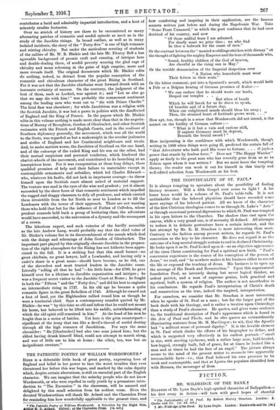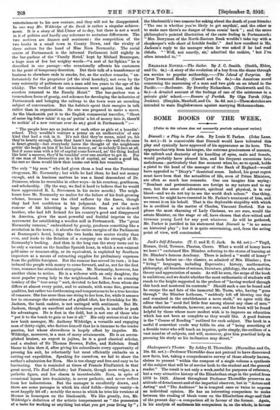FICTION.
MR. WILDRIDGE OF THE BANK.t
READERS of Mr. Lynn Doyle's high-spirited chronicles of Ballygullion- his first essay in fiction—will turn with good hopes of cheerful • The lndisidaality of St. Paul. By Robert Harvey Strachan. London : J. Clarke and Co. 13a. tin• net.) t Mr. Waridge of the Bank. By Lynn Doyle. London : Duckworth and Co. Lam] entertainment to his new venture, and they will not be disappointed. In one way Mr. Wildridge of the Bank is rather a singular achieve- ment. It is a story of Mid-Ulster of to-day, but there is not a word in it of politics and hardly any reference to sectarian differences. The two motives are fmance and sentiment : the competition of the two banks in a small town in County Down, and the rivalry of three suitors for the hand of Miss Nora Normanby. The social centre of Portnamuck is the informal Parliament held nightly in the bar-parlour of the Family Hotel,' kept by Michael Brannegan, a huge man of few but weighty words—"a sort of fat Sphinx" he is described in one passage—who occasionally affronts his customers to the point of temporary desertion. But their talk of a transference of business to elsewhere ends in smoke, for, as the author remarks, " un- fortunately for the proprietor [of the rival hostelry], not even by the very extremity of politeness can a man add ten years to the age of his whisky. Tho verdict of the connoisseurs went against him, and the seceders returned to the Family Hotel." The bar-parlour was a tremendous focus of gossip, and schemes for developing the industries of Portnamuck and bringing the railway to the town were an unending subject of conversation. But the habitues spent their energies in talk rather than in organization. No one was prepared to make a move. As the blacksmith put it to the English commercial traveller, " Short of some big fellow takin' it up an' puttin' a lot of money into it, there'll be nothin' of a new venture ever do any good in Portnamuck " :—
" The people here are as jealous of each other as girls at a boardin'- school. They wouldn't venture a penny on an undhertakin' of any kind that had a risk in it. It's not that they're mean, mind ye, for they're hearty enough, them that hasn't too much—the well-to-do ones is heart-greedy—but everybody hates the thought of the neighbours gettin' the laugh on him if he lost his money, an' so nobody'll face at alL But if some man with a bit of capital come forward, an' the thing looked like bein' a success, they'd be tnmblin' over one another to get in. For if one man of themselves put in a bit of capital, an' made a good bit, the rest av them would blow their brains out with fair vexation."
The only " big man " who had given them a lead was the Protestant clergyman, Mr. Normanby; but while ho had ideas, he had not money enough, and in business matters he was a lineal descendant of Dr. Primrose, whom he resembles in other ways—in his courtesy, gentleness, and scholarship. (By the way, we find it hard to believe that he would have appreciated R. L. Stevenson in his racier moods.) The neigh- bours bore Mr. Normanby no malice for the failure of his fruit-growing scheme, because he was the chief sufferer by the fiasco, though they had lost confidence in his judgment. And yet the mere rumour of his inheriting a large fortune from a no brother, who had left Ireland for his country's good and disappeared in America, gives the most powerful and fruitful impetus to the movement for establishing a woollen mill in Portnamuck. The "great Normanby rumour," embroidered by gossip, produces something like a revolution in the town ; it absorbs the entire energies of the Parliament at Brannegan's hotel, brings the two banks into acuter rivalry than ever, and leads to the flotation of a company on the strength of Mr. Normanby's backing. And then in tho long run the story turns out to be only a variant on the familiar Spanish hoax, in which a non-existent gold-mine or treasure-ship, or its equivalent, is exploited by Southern impostors as a means of extracting supplies for preliminary expenses from the gullible foreigner. But the rumour has served its turn ; it has induced the people with money to come forward, and so, not for the first time, romance has stimulated enterprise. Mr. Normanby, however, has another claim to notice. He is a widower with an only daughter, the most popular young lady in the neighbourhood. Nora is an amazing tomboy of the " tear-away " sort, devoted to her father, from whom she differs at almost every point, and to animals, with some fine, generous qualities, but rather too forthcoming and tempestuous to be a true heroine of romance. She has more than one string to her bow, for, while it amuses her to encourage the attentions of a gilded idiot, her friendship for Mr. Jackson, the bank cashier, is not untinged with sentiment. But Mr. Jackson, though an excellent and chivalrous youth, is unable to push his advantages. He is first in the field, but is not one of those who " put it to the touch to gain or lose it all." His only serious rival is the new bank manager, Mr. Anthony Wildridge, a versatile and engaging man of thirty-eight, who flatters himself that ho is immune to the tender passion, but whose shrewdness is largely offset by impulse. Mr. Wildridge, moreover, is a man of many attainments. He is an accom- plished bruiser, an expert in jujitsu, he is a good classical scholar, and a student of Sir Thomas Browne, Fuller, and Rabelais. Small blame to him then if, after giving his subordinate every opportunity of pressing his suit, he reluctantly but most efficiently embarks on a cutting-out expedition. Speaking for ourselves, we fail to share the author's admiration for Nora. She is too slangy and free-and-easy to be fascinating. One is reminded at times of Francis FitzPatrick in that great novel, The Real Charlotte; but Francie, though more vulgar, is a pathetic figure, and her charm is incontestable. Nora, in spite of occasional lapses into femininity, is never pathetic, and never suffers from her indiscretions. But the manager is excellently drawn, and there are some passages in which his chief foible—literary vanity—is most happily bit off ; notably the scene in which he tries his versions of Horace in homespun on the blacksmith. We like greatly, too, Mr. Wildridge's definition of the artistic temperament as " the possession of a taste for working at anything but what you get your living by " ; the blacksmith's two reasons for asking about the death of your friende.: " The one is whether you're likely to get anythin', and the other is to make sure there's no danger of them comin' baok " ; and the same philosopher's pointed illustration of the caste feeling in Portnamuck: " Mrs. Berryman of the North-Eastern Bank wouldn't take tay with a shopkeeper's wife short of forcible feedin'." And how excellent is Mr. Jackson's reply to the manager when he was asked if he had read Othello. " Well, not exactly, air,' admitted the cashier, but I've often intended to.' "































 Previous page
Previous page